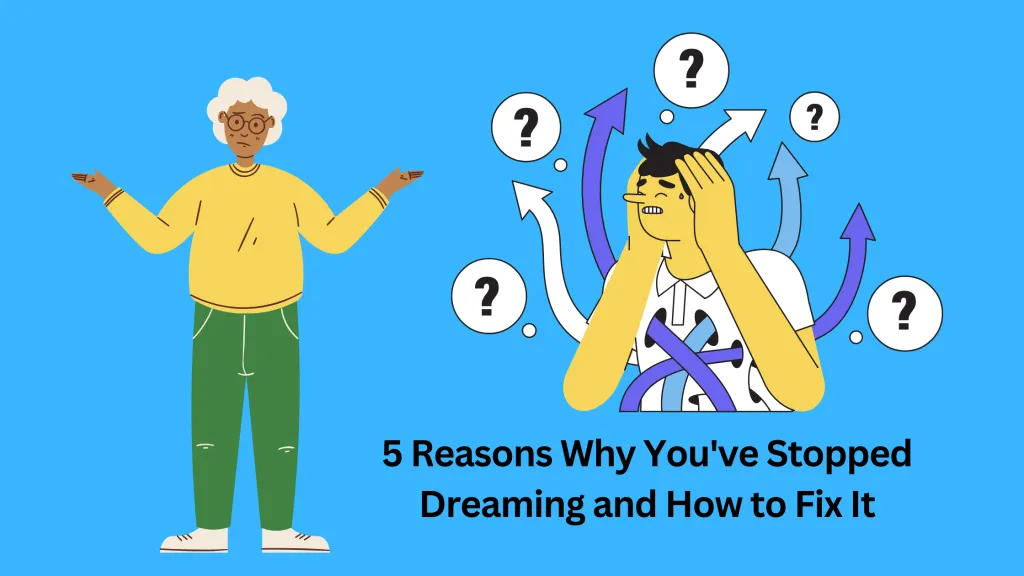
Do you ever wake up in the morning feeling exhausted, but can’t recall any dreams from the night before? If so, you’re not alone.
Many people have experienced this phenomenon of lost dreams and are left wondering why they no longer dream. In this blog article, we’ll be uncovering the mystery behind why some people don’t dream anymore and exploring ways to reclaim sweet slumber with restful dreams.
5 Reasons why do some people stop having dreams
Waking up after a night of sleep and realizing that you can’t remember any dreams can be quite disconcerting to not have any recollection of your dream life, especially if it was something that happened regularly.
So why do some people stop having dreams?
The truth is, there are many potential reasons why someone might not be dreaming anymore.
1. Stress and Anxiety
When we are feeling overwhelmed with worry or fear it can cause us to wake up more frequently throughout the night which disrupts our natural sleeping patterns and prevents us from entering into deeper stages where dreaming occurs.
Stress can lead to difficulty falling asleep or staying asleep throughout the night, which can leave us feeling exhausted when we wake up.
Additionally, it has been found that people who experience high levels of stress tend to have fewer dreams than those who don’t feel as overwhelmed by their daily lives.
2. Medication
The capacity of our brains to dream can be hampered by the use of certain drugs. certain medications such as antidepressants may also interfere with REM sleep cycles leading to fewer dreams being experienced by those taking them regularly over time.
3. Substance Abuse
Abuse of substances like alcohol and narcotics can cause disruptions in our natural sleep cycles, which can result in a reduction in the number of dreams we have.
Abuse of substances can also lead to psychological problems such as depression and anxiety, both of which can have a negative effect on our ability to dream.
4. Not getting enough quality sleep
Our capacity to dream is directly influenced by the amount of sleep we get each night. Our brains do not have the capacity to process and generate dreams when we do not obtain the recommended amount of sleep each night.
However, not getting enough sleep can result in both physical and mental tiredness, both of which can have a negative effect on our capacity to dream. Dreams typically occur during REM (rapid eye movement) sleep, which happens in the later stages of our slumber cycle.
If we don’t get enough restful deep-sleep cycles each night, then our bodies won’t reach this stage and therefore no dreaming will take place.
5. Trauma
The effects of trauma can be long-lasting, not just on our mental health but also on our capacity to imagine the future. Nightmares and night terrors are both symptoms of post-traumatic stress disorder (PTSD), which can arise as a result of stressful experiences and lead to their growth.
Trauma can also lead to mental health issues such as sadness and anxiety, both of which can have a negative impact on our ability to dream.
It’s important to note however that while some people may experience periods without dream recall due to one or more of these factors; for most individuals, this will usually only last temporarily until their body finds its balance again and they begin having regular vivid dreams once more!
In fact, research has shown that even if someone has gone months without remembering a single dream they still enter into REM states every night just like everyone else – so don’t despair!
How to keep your dreams alive
If you have noticed a decline in the frequency of your dreams or if you have completely stopped dreaming, the following are some suggestions on how you can keep your dreams alive:
Practice Good Sleep Hygiene
It is necessary for both our mental and physical well-being, as well as our capacity for dreaming, that we get an adequate amount of sleep each night.
The following are some suggestions that can help you improve your sleeping habits:
- Stick to a regular sleep schedule, even on weekends.
- Create a relaxing sleep environment by dimming the lights and keeping your bedroom cool.
- Avoid caffeine, nicotine, and alcohol before bed.
- Turn off electronic devices at least an hour before bedtime.
- Establish a relaxing bedtime routine, such as taking a warm bath or reading a book.
- Exercising regularly has been proven to help alleviate tension and improve our quality of sleep.
Keep a Dream Journal
One way to start exploring this issue is by keeping a dream journal or diary. Writing down what little details we do remember about our nocturnal adventures will help us become more aware of patterns in our dreaming life and gain insight into what might be blocking us from remembering them fully when we wake up in the morning.
Additionally, writing down any thoughts or feelings associated with these memories can provide valuable clues as well!
Meditation or mindfulness practice before bedtime
Allowing yourself some time each evening to relax deeply and clear your mind before sleep could potentially improve your chances of remembering those elusive visions come morning light!
And if all else fails… try setting multiple alarms throughout the night so that if something does happen while sleeping (like having a vivid dream) then at least one alarm will go off giving you enough time to jot down some notes on it before it fades away completely!
Reduce Stress and Anxiety
There are some things that might help reduce your stress levels and allow for more restful sleep with vivid dreams!
Taking time out each day for yourself is key – whether it’s reading a book or going on a walk – anything, where you can relax and unwind from all the pressures around us, will do wonders for reducing your overall anxiety levels.
The following is a list of suggestions that can help relieve anxiety and stress:
- Practice relaxation techniques, such as deep breathing, meditation, or yoga.
- Exercise regularly, as physical activity can help reduce stress and improve sleep quality.
Address Underlying Issues
Sometimes, a reduction in the frequency or intensity of one’s dreams can be an indication that there is an underlying problem.
If you are also suffering additional symptoms, such as exhaustion, difficulty concentrating, or changes in appetite or mood, it is highly recommended that you consult with a qualified medical practitioner as soon as possible.
Talking about how we’re feeling with friends or family members can also make us feel better mentally so we’re not carrying all these worries alone at night while trying to fall asleep.
Seek Professional Help
If you have seen a considerable drop in the number of dreams you have or if you have completely stopped dreaming, it may be time to seek the assistance of a trained specialist.
Any underlying psychological issues that may be affecting your capacity to dream can be addressed with the assistance of a therapist or counselor who can guide you through the process.
In addition, consulting a sleep specialist can assist you in determining whether or not you are suffering from any sleep problems that could be influencing the content of your dreams.
Finding Peace and Clarity in a Dream-Free World
We all have moments in our lives when we feel overwhelmed and need to find peace and clarity. Here are some ways to achieve inner peace without relying on dream-filled nights.
Meditation or mindfulness practices
One way is through meditation or mindfulness practices. Taking time out of your day to focus on the present moment can help you gain perspective and clear away any mental clutter that may be clouding your thoughts.
You could also try journaling, which allows you to express yourself freely while processing difficult emotions or experiences.
Spending time outdoors in nature
Another great option is spending time outdoors in nature – walking around a park, going for a hike, or simply sitting outside with the sun shining down on you can be incredibly calming and restorative for the soul.
Being surrounded by natural beauty helps us reconnect with ourselves as well as appreciate life’s simple pleasures more deeply than ever before!
Talking things out
Finally, talking things out with friends or family members who understand where we’re coming from can provide much-needed relief too!
Sharing our worries openly allows us to process them better while feeling supported by those closest to us at the same time – something that’s invaluable when trying to make sense of confusing situations within ourselves or our lives overall.
Start by reflecting on what truly makes you happy
Think about activities or hobbies that bring joy into your day-to-day routine. Then consider how these passions could be used as stepping stones toward achieving bigger goals in the future.
Maybe there’s something new that sparks your interest or maybe it’s time for a fresh approach to an old dream? Whatever it is, remember: anything is possible if we put our minds (and hearts) into it!
No matter how hard it might seem right now not having dreams anymore doesn’t mean finding peace and clarity has become impossible; rather it just means taking different routes toward achieving these goals instead!
FAQs
Q: Can medication cause a permanent decrease in dream activity?
A: Yes, in some people, taking certain drugs might result in a permanent reduction in the amount of time spent dreaming.
But, this is not always the case, and if you are having this issue, it is in your best interest to consult with a healthcare professional about it.
Q: Is it normal to not dream every night?
A: It is perfectly common to have nights where you do not dream. The average person has four to five dreams per night, although some people have even more or fewer.
In addition, just because you can’t recall your dreams does not mean that you didn’t have them in the first place.
Q: Can trauma cause nightmares?
A: The answer is yes; traumatic experiences can give rise to night terrors and nightmares. Talking to a medical expert is something you should consider doing if you have been having recurring terrifying dreams or episodes during the night.
Q: Can medication affect my ability to dream?
A: The stage of sleep in which humans have the most vivid dreams is called rapid eye movement (REM), and many drugs, particularly antidepressants, can inhibit its production.
Conclusion
Dreams are an essential part of our lives, providing us with a sense of purpose and direction. They give us something to strive for and keep us motivated even when times are tough.
So if you’re feeling like you’ve lost sight of what matters most, now is the perfect time to take a step back and reconnect with those aspirations that make life worth living!
Remember that your dreams have the potential to reveal important information about what drives and inspires you on the deepest level.







